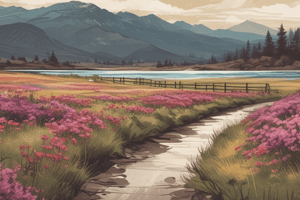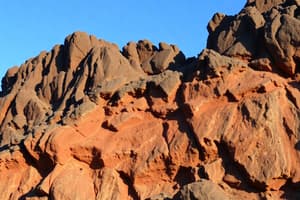Podcast
Questions and Answers
Which of the following best describes the rock cycle?
Which of the following best describes the rock cycle?
- The process of rocks melting as they are pushed deep under the Earth's surface
- The process of rocks breaking down and dissolving when exposed to the atmosphere
- The process of rocks remaining in equilibrium and not changing
- The process of rocks changing from one type to another over time (correct)
What are the three main types of rocks in the rock cycle?
What are the three main types of rocks in the rock cycle?
- Igneous, sedimentary, and metamorphic (correct)
- Sedimentary, basalt, and igneous
- Metamorphic, sedimentary, and basalt
- Basalt, sedimentary, and metamorphic
What happens to an igneous rock when it is exposed to the atmosphere?
What happens to an igneous rock when it is exposed to the atmosphere?
- It breaks down and dissolves (correct)
- It melts
- It remains in equilibrium
- It becomes sedimentary
What causes rocks to change in the rock cycle?
What causes rocks to change in the rock cycle?
What kind of cycle is the rock cycle?
What kind of cycle is the rock cycle?
Flashcards are hidden until you start studying
Study Notes
The Rock Cycle
- The rock cycle is the continuous process by which rocks are formed, transformed, and destroyed.
Types of Rocks
- The three main types of rocks in the rock cycle are Igneous, Sedimentary, and Metamorphic.
Weathering of Igneous Rocks
- When an igneous rock is exposed to the atmosphere, it undergoes weathering, which breaks it down into smaller particles.
Drivers of Change in the Rock Cycle
- Rocks change in the rock cycle due to geological processes such as heat, pressure, erosion, and sedimentation.
Nature of the Rock Cycle
- The rock cycle is a continuous, ongoing, and ever-changing process.
Studying That Suits You
Use AI to generate personalized quizzes and flashcards to suit your learning preferences.




